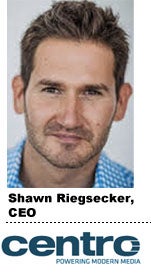 Centro’s estimated $40 million purchase of demand-side platform SiteScout isn’t just intended to imbue the digital media workflow specialist with real-time bidding chops. Read the release.
Centro’s estimated $40 million purchase of demand-side platform SiteScout isn’t just intended to imbue the digital media workflow specialist with real-time bidding chops. Read the release.
For Centro CEO Shawn Riegsecker, the point of this deal goes beyond wrenching the obvious efficiencies of having a DSP function in-house. Adding SiteScout will prepare Centro for the time when the online ad industry is populated by end-to-end software providers and the alphabet soup of DSPs, supply-side platforms (SSPs), data-management platforms (DMPs) and ad networks all begin to disappear.
For the moment, owning SiteScout sets the stage for Centro’s next goal: offering predictive analytics for guaranteed buys and RTB, a function that is generally handled by DMPs, over the next year.
“It’s easy to describe yourself as a ‘mobile company’ or a ‘video company’ or say you’re an SSP, DSP or DMP,” said Riegsecker. He said he would prefer for Chicago-based Centro to be considered a unified platform for buying and selling digital media, something that would resist an easy acronym. “What matters is who can deliver media in the clearest, most effective way. At some point, those boxes that are identified by one single abbreviation have to be disintegrated, because the industry can’t support the waste and the limits associated with it.”
SiteScout will be integrated alongside Centro’s existing publisher-facing programmatic display ad server, Brand Exchange. But that doesn’t mean the company will compete against marketplace and exchange operators like AppNexus, Riegsecker said. Its chief rival probably remains media sales workflow firm Mediaocean, which despite moves into display, also continues to serve TV buys – unlike Centro.
For Centro, the focus remains on digital and pitching itself as an all-in-one solution for those buyers and sellers.
“As a company, we’ve been doing RTB for the last 18 months,” Riegsecker said. “And that included using other DSPs. We’ve grown that side of our business significantly. We will now be moving those functions in-house with our own technology stack.”
Toronto-based SiteScout’s 33 staffers will join Centro’s roughly 400 employees as the integration is completed. Once that happens, Riegsecker said he expects to double the number of engineers in the Canadian operation, noting that the self-serve SiteScout is mostly comprised of engineers and has a very small support staff and no sales of its own.
The next acquisition for Centro could be a DMP. Riegsecker wants to demonstrate that the data Centro can gather can also be understood in a more actionable way. But he declined to name potential prospects.
“Now that we’ve got workflow done, now that we’ve got RTB done, we need to move into predictive analytics across guaranteed and biddable inventory so we can help marketers make smarter decisions precampaign, then incorporate real-time optimization across both industry sources while the campaign is actually running,” Riegsecker said. “That is something we’ll take a strong look at once we’ve got the SiteScout integration complete.”
This is Centro’s second acquisition, and it could not be more different from the first. The purchase of the Real Cities local content network from McClatchy Newspapers in 2008 was its only previous purchase.












